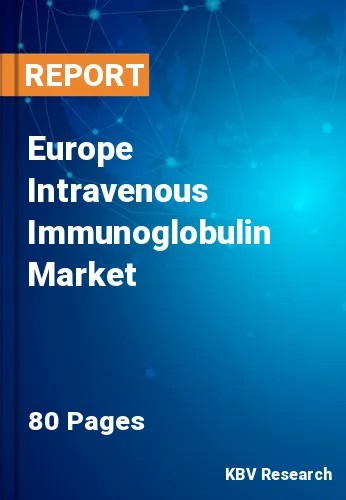The Europe Intravenous Immunoglobulin Market would witness market growth of 6.4% CAGR during the forecast period (2022-2028).
Intravenous infusion is the process of administering IVIg by a drip into a vein. If an individual is merely taking it to boost the immunoglobulin levels after other therapies, it's sometimes given as a muscle injection. Each time people need to get a therapy, they need to visit a hospital. This is because the medicine must be delivered slowly, the infusion would take several hours. During the drip, the blood pressure, pulse, and temperature will be measured on a frequent basis to monitor the body's reaction. If patients don't have any problems during the first hour of the infusion, the doctor or nurse who is caring for the person will increase the rate. After it's completed, the patient has to stay at the hospital for an hour to be monitored for any after-effects.
The rise in the prevalence of autoimmune illnesses such as multiple sclerosis, immune thrombocytopenia purpura (ITP), autoimmune hemolytic anemia, and Kawasaki syndrome is driving the intravenous immunoglobulin market. This is due to technical improvements leading to the development of novel products and purification technologies. The rapid development in the number of neurological illnesses, as well as the geriatric population and patient pool, has spurred the demand for speedy and reliable treatment options. To diversify their revenue streams, all companies should enhance the R&D efforts in the development of unique products.
As people willingness to live longer and healthier lives, the demand for breakthrough medical technology solutions like intravenous immunoglobulin continues to rise. The population of the region is well aware of medical technologies and displays complete support for new technology in the region. This opens up chances for the medical technology industry, which is nearly completely made up of small and medium-sized businesses in Germany. One of the most fascinating areas of health care is making it easier for people to recuperate from surgical procedures.
International businesses in the sector are discovering that Germany, Europe's largest health market, is an excellent place to establish advanced technology like intravenous immunoglobulin’s presence and expand sales. The close partnership between research and industry has enabled Germany's medical technology industry to become a benchmark for quality, performance, and safety.
The Germany market dominated the Europe Intravenous Immunoglobulin Market by Country in 2021, and would continue to be a dominant market till 2028; thereby, achieving a market value of $1,028.3 million by 2028. The UK market is estimated to grow at a CAGR of 5.5% during (2022 - 2028). Additionally, The France market would witness a CAGR of 7.2% during (2022 - 2028).
Based on Distribution Channel, the market is segmented into Hospital Pharmacy, Specialty Pharmacy, and Others. Based on Application, the market is segmented into Immunodeficiency Diseases, Chronic Inflammatory Demyelinating Polyneuropathy, Hypogammaglobulinemia, Chronic Lymphocytic Leukemia & Myasthenia Gravis, Congenital AIDS & Multifocal Motor Neuropathy, Kawasaki Disease, Guillain-Barre Syndrome, Immune thrombocytopenia (ITP), and Others. Based on countries, the market is segmented into Germany, UK, France, Russia, Spain, Italy, and Rest of Europe.
Free Valuable Insights: The Global Intravenous Immunoglobulin Market will Hit $17.3 Billion by 2028, at a CAGR of 6.9%
The market research report covers the analysis of key stake holders of the market. Key companies profiled in the report include Grifols, S.A., Takeda Pharmaceutical Company Limited, Baxter International, Inc., Biotest AG (Tiancheng International Investment Limited), LFB S.A., CSL Limited (CSL Behring), Octapharma AG, Kedrion S.p.A, and Bayer AG.
By Distribution Channel
By Application
By Country
Our team of dedicated experts can provide you with attractive expansion opportunities for your business.

